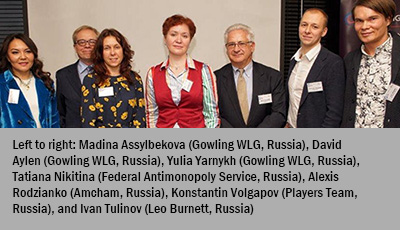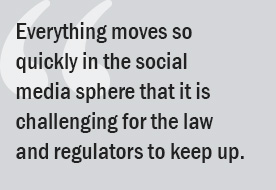Moscow Roundtable Report: Brands, Consumers, and Influencers—Is All Really Fair in Love and War?
Published: May 1, 2019
David Aylen Gowling WLG Moscow, Russia
 Russian government officials, brand owners, influencers, and marketing gurus gathered on March 21 for the INTA Pre‒Annual Meeting reception and roundtable in Moscow, Russia, co-hosted by the American Chamber of Commerce and Gowling WLG (Russia). More than 100 guests came to learn about the latest strategies and developments in the influencer marketing (IM) industry.
Russian government officials, brand owners, influencers, and marketing gurus gathered on March 21 for the INTA Pre‒Annual Meeting reception and roundtable in Moscow, Russia, co-hosted by the American Chamber of Commerce and Gowling WLG (Russia). More than 100 guests came to learn about the latest strategies and developments in the influencer marketing (IM) industry.
INTA’s Strategic Plan includes an initiative to “embrace innovation and change.” With that in mind, the roundtable looked at how IM is revolutionizing the way brands are promoted to consumers.
Ivan Tulinov (Leo Burnett, Russia) and Konstantin Volgapov (Players Team Marketing, Russia) opened the event by explaining how IM has evolved to become one of the most effective means to promote brands to an intended audience and to make the right connection. When it comes to influencers, presenters agreed that it’s “all about consumers talking to consumers,” noting that the effectiveness of IM is due to influencers’ ability to engage their followers on social media. These Influencers are strong on the “trust barometer,” an apt term coined by the Edelman global communications marketing firm.
 Tatiana Nikitina, Head of the Department for Control over Advertising and Unfair Competition at the Federal Antimonopoly Service (FAS) of Russia, said that everything moves so quickly in the social media sphere that it is challenging for the law and regulators to keep up. She noted that the FAS does not yet have any official guidelines akin to the U.S. Federal Trade Commission’s Endorsement Guidelines, which include IM within their ambit. Currently, she explained, the FAS looks at IM on a case-by-case basis. Due to the huge volume of social media interactions, it is impossible to monitor all activities all of the time, Ms. Nikitina noted.
Tatiana Nikitina, Head of the Department for Control over Advertising and Unfair Competition at the Federal Antimonopoly Service (FAS) of Russia, said that everything moves so quickly in the social media sphere that it is challenging for the law and regulators to keep up. She noted that the FAS does not yet have any official guidelines akin to the U.S. Federal Trade Commission’s Endorsement Guidelines, which include IM within their ambit. Currently, she explained, the FAS looks at IM on a case-by-case basis. Due to the huge volume of social media interactions, it is impossible to monitor all activities all of the time, Ms. Nikitina noted.
Although the law is not entirely clear in Russia on the subject of brand promotion, there are some basic rules of thumb, said Yulia Yarnykh (Gowling WLG, Moscow). Russia does not prohibit brand advertising on social media, but it does generally prohibit messages containing “indirect advertising.” Broadly speaking, indirect advertising is messaging that is not consciously perceived by consumers to be advertising (e.g., a lifestyle image that incidentally depicts a brand as part of the overall experience).
Brand owners should make it a priority to control the use of their brand on social media, Mr. Yarnykh said. To this end, he recommended that they formalize relationships with influencers whenever possible to preserve brand integrity.
Although every effort has been made to verify the accuracy of items in the INTA Bulletin, readers are urged to check independently on matters of specific concern or interest.
© 2019 International Trademark Association
This website uses cookies so that we can provide you with the best user experience possible. Cookie information is stored in your browser and performs functions such as recognising you when you return to our website and helping our team to understand which sections of the website you find most interesting and useful.
To find out more please see our Cookies Policy and Privacy Policy.
These cookies are used to identify a user’s browser as the visitor goes from page to page on the Site. These are session cookies, which means that the cookie is deleted when you leave the Site. It is an integral piece of the Site software and used to let the server know which users are on the Site at any given time and make certain parts of the Site easier to use.
|
|
If you disable this cookie, we will not be able to save your preferences. This means that every time you visit this website you will need to enable or disable cookies again.
These cookies are used to collect information about how visitors use our Site. The cookies collect information in anonymous form, including the numbers of visitors to the Site, where visitors have come to the Site from, the pages they visited and how they have interacted with tools on the Site like search and embedded media players. We use the information to compile statistical reports of our users’ browsing patterns so that we can improve the Site.
|
|
Please enable Functionality Cookies first so that we can save your preferences!
These cookies are used to deliver advertising relevant to the interests of visitors to our Site. They are persistent, which means they will remain on your device after you leave the Site.
- Facebook (Ad Pixel)
- Google (Ad Pixel)
- LinkedIn (Ad Pixel)
- Quattro Anonymous
Please enable Functionality Cookies first so that we can save your preferences!
